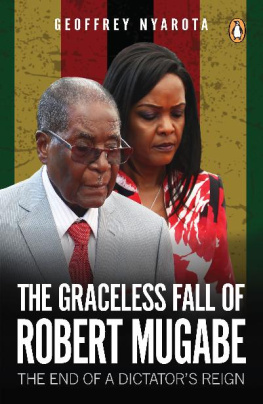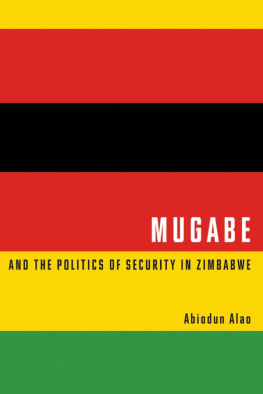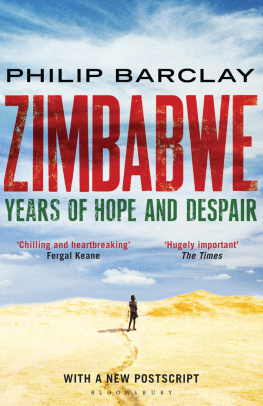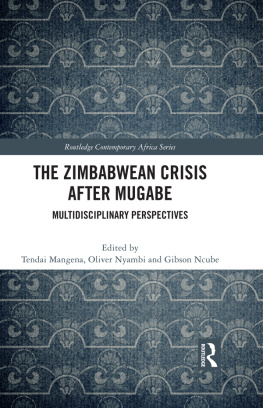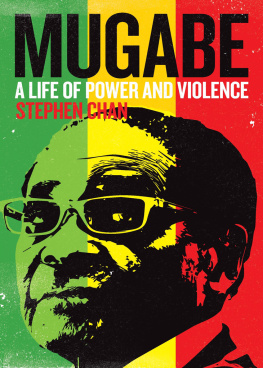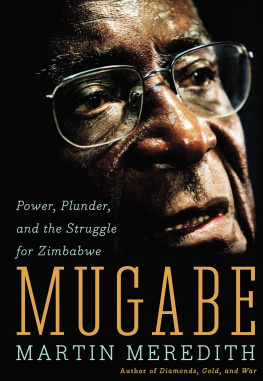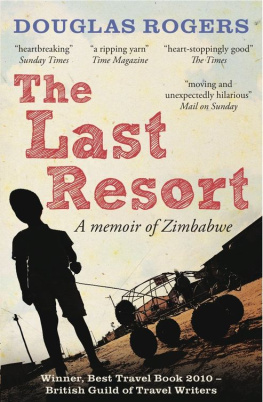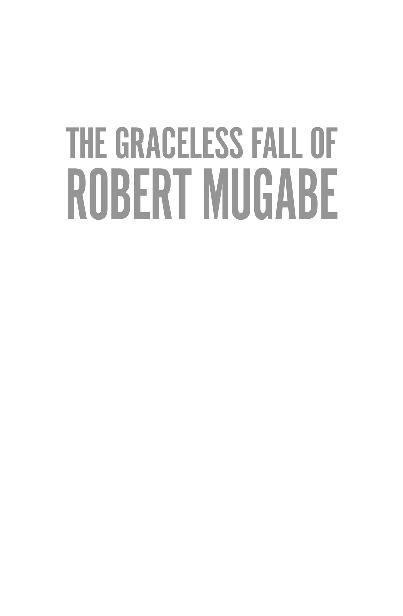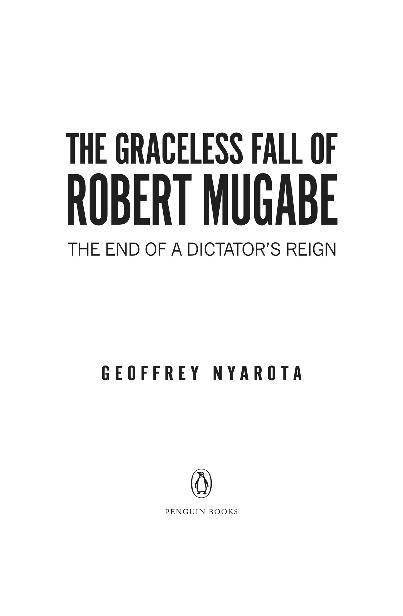Published by Penguin Books
an imprint of Penguin Random House South Africa (Pty) Ltd
Reg. No. 1953/000441/07
The Estuaries No. 4, Oxbow Crescent, Century Avenue, Century City, 7441
PO Box 1144, Cape Town, 8000, South Africa
www.penguinrandomhouse.co.za
First published 2018
1 3 5 7 9 10 8 6 4 2
Publication Penguin Random House 2018
Text Geoffrey Nyarota 2018
Cover photograph The Herald
All rights reserved. No part of this publication may be reproduced, stored in a retrieval system or transmitted, in any form or by any means, electronic, mechanical, photocopying, recording or otherwise, without the prior written permission of the copyright owners.
PUBLISHER : | Marlene Fryer |
MANAGING EDITOR : | Robert Plummer |
EDITOR : | Dane Wallace |
PROOFREADER : | Lisa Compton |
COVER AND TEXT DESIGNER : | Ryan Africa |
TYPESETTER : | Monique van den Berg |
INDEXER : | Sanet le Roux |
Set in 11.5 pt on 16.5 pt Adobe Garamond
ISBN 978 1 77609 346 5 (print)
ISBN 978 1 77609 347 2 (ePub)
This book is dedicated to the hundreds of thousands of law-abiding and peace-loving citizens of Zimbabwe, who over the first thirty-seven years of their countrys independence endured adversity, penury and injustice under the governance of the first prime minister and second president of the Republic of Zimbabwe, Robert Gabriel Mugabe. It is dedicated to the members of my own immediate family, who suffered intolerable anguish because of my commitment to the professional calling of journalism during the dictatorship of the former president.
Contents
On 22 November 2017, a day after President Robert Mugabe tendered his resignation from office, Penguin Random House South Africa asked if I would write a manuscript to capture the dramatic events surrounding the downfall of the man who had clung to the helm of power in Zimbabwe for thirty-seven years.
I was given a tight deadline to complete the manuscript, a task made more difficult by the reluctance of key figures to give their input. I had assumed that both President Mugabe and his spouse, the voluble First Lady Grace Mugabe, must be seized with a burning desire to present their own side of their great story.
Normally, I would have approached the presidents official spokesman, George Charamba, for assistance, even though he did not have a track record of facilitating interviews with the president, except when arranging the ceremonial Robert Mugabe birthday interview with the Zimbabwe Broadcasting Corporation. Charamba had, however, just shifted allegiance, and is now the official spokesman of Mugabes successor, President Emmerson Dambudzo Mnangagwa. To expect him to arrange any useful dialogue with the former president would most certainly have been an act of impudence.
At the time of Mugabes downfall, an unlikely person had been portrayed as his constant guardian, mentor and advisor: Father Fidelis Mukonori, S.J., an affable clergyman of the Catholic Church. I was aware that Father Mukonori had granted interviews to some foreign journalists, in which he spoke mainly of his own role in the negotiations between Mugabe and the military generals, leading to the former presidents resignation. I telephoned and requested an interview with him and, hopefully, with the former head of state. Mukonori said I must submit a list of questions in writing, but when I did so, he did not respond. Further efforts to contact him by telephone were futile.
While I was waiting to hear from Father Mukonori I discovered that his memoir, Man in the Middle , had appeared in bookshops.
In the circumstances, The Graceless Fall of Robert Mugabe is based on my own observations as a journalist over the years and on research into the events around the presidency of Zimbabwes controversial leader of nearly four decades.
My narrative is based on my examination of events as I saw them unfold from my privileged position as a reporter and a newspaper editor. While my book will not be the only chronicle of the events in question, it will be among the very first comprehensive documentations, crafted by one of the people with a vested interest in the events the citizens of Zimbabwe. There will, no doubt, be a host of other accounts of the man who will remain one of Zimbabwes greatest and most controversial leaders and the dynasty that he created over a period of four decades. It is my sincere hope that Zimbabwe will benefit, in the fullness of time, from a proliferation of narratives about Robert Mugabe.
This project could not have been accomplished without the able, willing and proficient assistance of a number of people. I am most grateful primarily to my editor, Advocate Muchadeyi Ashton Masunda. A long-time friend of mine, he was the chairman and subsequently the chief executive officer of Associated Newspapers of Zimbabwe when I was founding editor-in-chief of its flagship newspaper, The Daily News , and he later became mayor of Harare. Masundas two gifts, an elephantine memory and an exacting command of the English language, were an invaluable asset during the writing of this manuscript. I am indebted to my son, Julian Tafirenyika Nyarota, a wordsmith in his own right, who became my primary researcher, proofreader and fearless critic. I wish to extend my gratitude to Annie Musemburi-Musodza, my former personal assistant at The Daily News , who sacrificed her weekends to provide administrative services for the project.
I would also like to acknowledge the contribution of Dane Wallace, my editor at Penguin, who did sterling work editing the text and structuring the narrative. I am grateful to my publishers, Penguin Random House South Africa, for their sustained commitment to publishing my book and for their loyalty to me at a time when I was receiving a very raw deal from my own compatriots in Zimbabwe.
Above all, to my wife, Ursula Virginia, and to my children and grandchildren, I am eternally grateful for your moral support, understanding, patience and enduring faith in me, as well as for the endless errands you ran, often amidst hardship, to make the manuscript a reality.
GEOFFREY NYAROTA
HARARE, JUNE 2018
AIPPA: Access to Information and Protection of Privacy Act
ANC: African National Congress
CIO: Central Intelligence Organisation
DRC: Democratic Republic of Congo
ESAP: Economic Structural Adjustment Programme
FRELIMO: Mozambique Liberation Front
G40: Generation 40
GNU: Government of National Unity
IMPI: Information and Media Panel of Inquiry
MDC: Movement for Democratic Change
MDC-T: Movement for Democratic Change Tsvangirai
MP: Member of Parliament
NCA: National Constitutional Assembly
NDP: National Democratic Party
NGO: non-governmental organisation
PAC: Pan Africanist Congress
PF-ZAPU: Patriotic Front Zimbabwe African Peoples Union
SABC: South African Broadcasting Corporation

